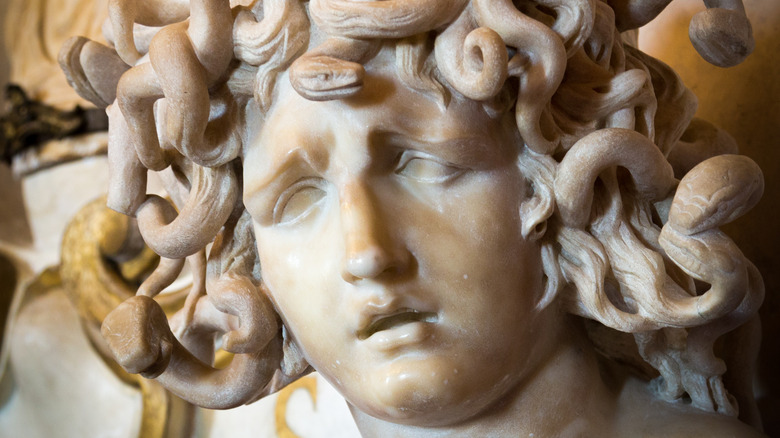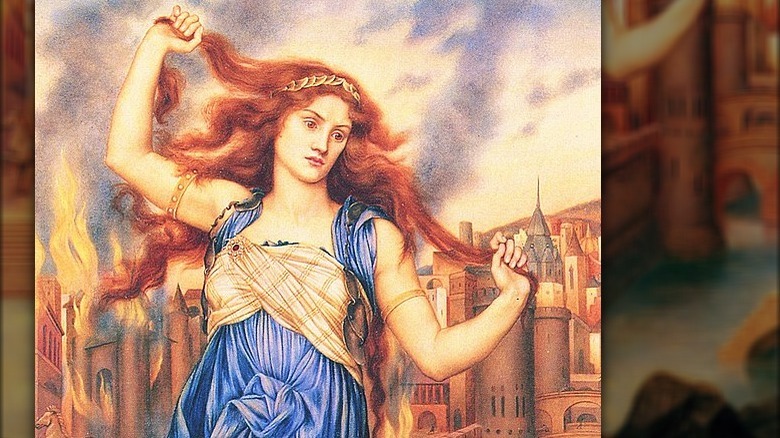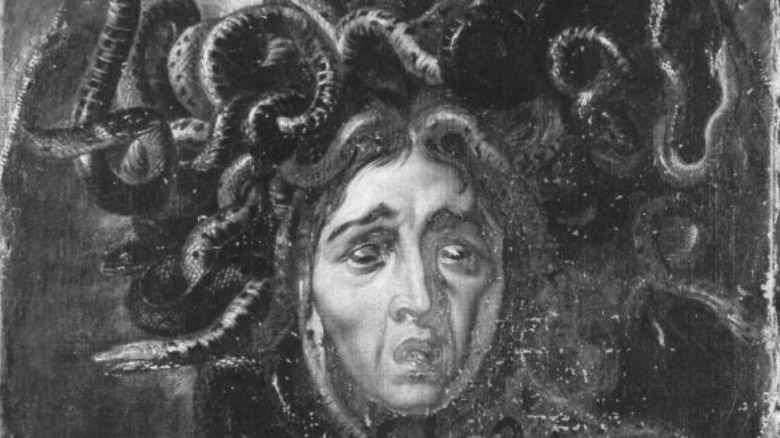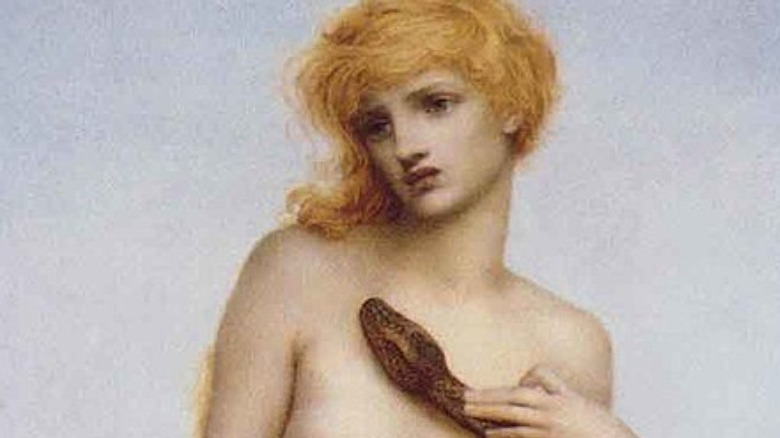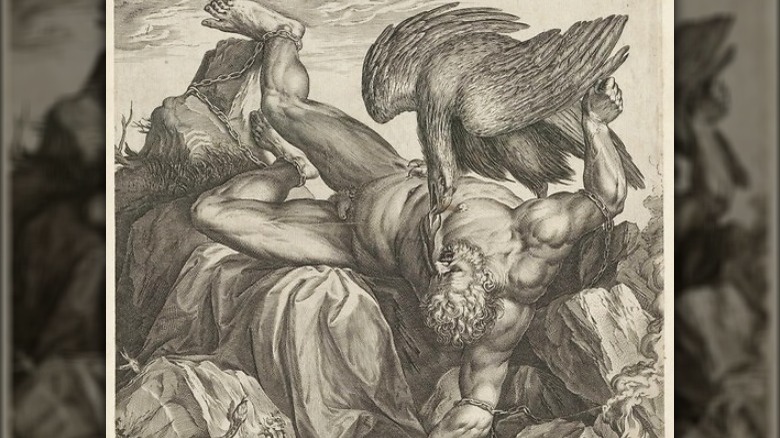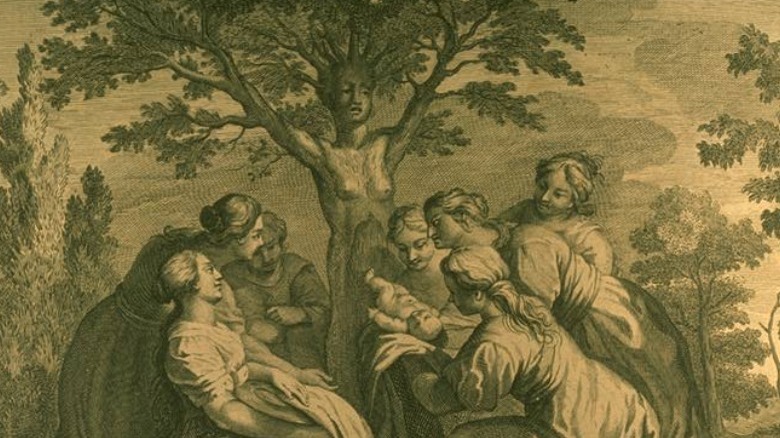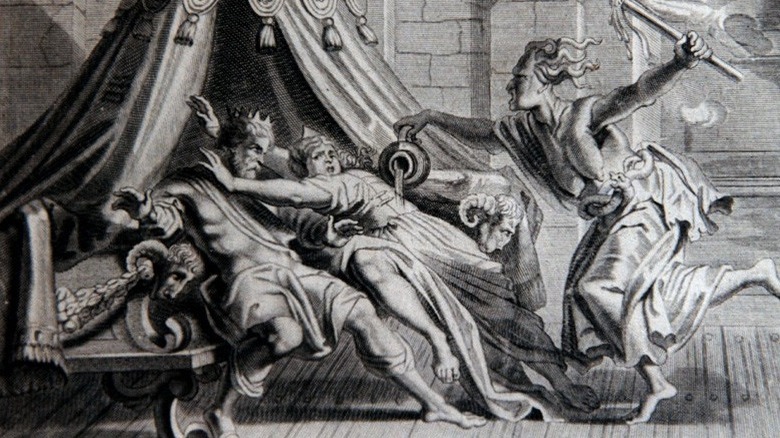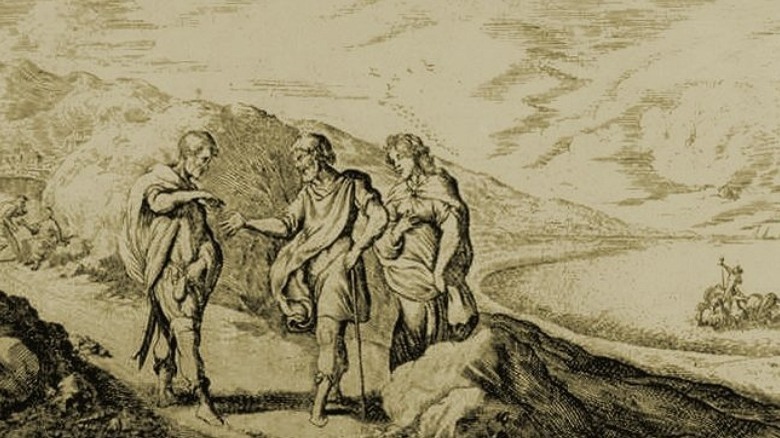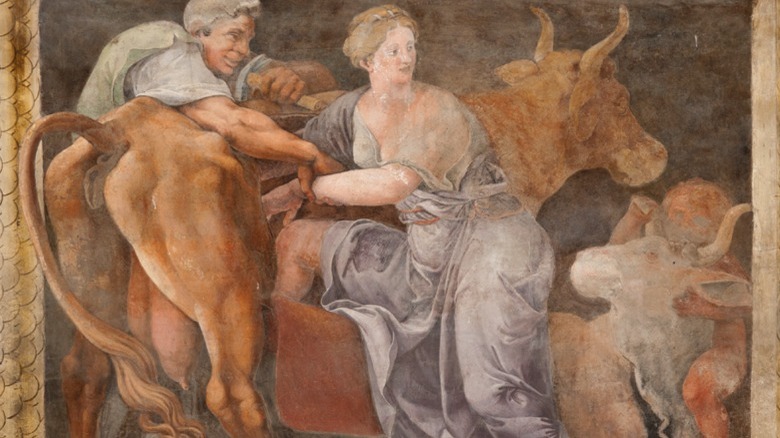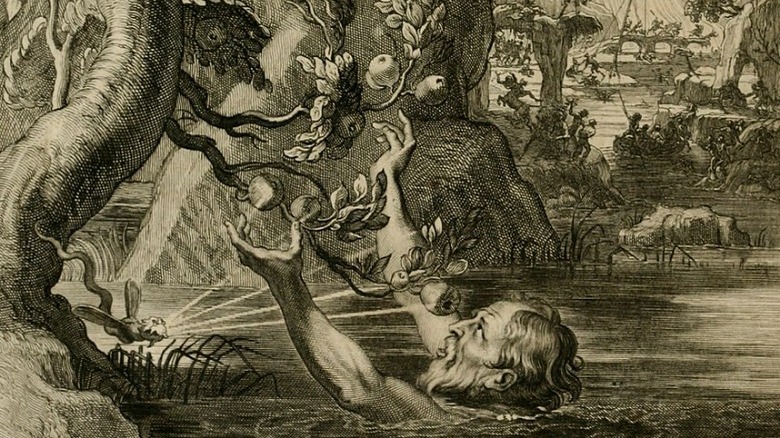The Cruelest Curses In Ancient Greek Mythology
There's no denying the fact that the ancient Greeks were brilliant. They gave us things like the steam engine and the vending machine — for real — and made other impressive contributions to the world. But at the end of the day, they were regular old humans, too — and sometimes, they really hated each other on a primal, personal level. One thing that the ancient Greeks really loved was their curses. In 2020, Haaretz reported on a fascinating find made by the German Archaeological Institute in Athens, and that was 30 engraved lead tablets that had been thrown down a well in Kerameikos.
It turns out that curse tablets themselves are nothing new: In a bit of epic-level pettiness, lead tablets engraved with curses have been found in a lot of tombs, where they were placed by people who believed that the deceased would take the curse into the afterlife with them and continue to suffer. It was so widespread a practice that around 317 BC, laws outlawing the practice were put in place. People needed another way to get their curses to follow the dead into the underworld, so they did the next best thing and tossed them in wells near burial grounds.
That's next-level, no matter what the century. The Greeks had a ton of practice in dishing out some dark and imaginative curses, and it's no wonder, really. They were just taking a page from the gods' playbook, and they were not the type to mess around.
Cassandra
Cassandra started out life as a perfectly normal girl. Things started to change when her parents took her to the shrine of the Thymbraean Apollo and — after spending the night there — she found she had been given the gift of understanding the divine through the sounds made by nature and particularly, by birds. It's a beautiful story, but it gets ugly real quick.
According to "A Dictionary of Greek and Roman Biography and Mythology" (via Tufts University), Cassandra returned to the temple years later. Now a grown woman, she caught the eye of Apollo himself, who wanted to do with Cassandra what the Greek gods often wanted to do with beautiful mortal women. She turned him down, though, and enraged by her rejection, he added another part to her gift of prophecy: a curse that no one would ever believe what she said.
This happened right before the Trojan War, and Cassandra's gift of prophecy allowed her to see the whole thing unfolding before it did. Her attempts to stop the war and avert scores upon scores of deaths ended when her father, Priam, declared her mad and had her locked away, and while she survived the war, she didn't live to see much past the end. After heading to one of Athena's temples to ask for protection, she was kidnapped and given to Agamemnon as a slave/prize, then was killed by Clytemnestra on their return to Greece.
Medusa
Medusa is one of the most famous characters in Greek mythology. Even those who don't know much about it will recognize her as the snake-haired woman who is so horrible that anyone who looks at her is turned to stone, but less well-known is her origin story. That's a shame, because Medusa was only a monster because of a heartbreaking curse.
Prospect says that as early as the 8th century BC, she appeared as the daughter of divine entities of the sea. While she's sometimes one of a set of three witch-like sisters that share a single eye, Ovid's story about her is the most widespread. He wrote (via ThoughtCo.) that she was a beautiful virgin priestess in the service of Athena, and it was the whole celibacy thing that went terribly wrong. Medusa caught the eye of Poseidon, and according to some versions, the union resulted in several children that included the flying horse, Pegasus. But the liaison didn't go unnoticed, and for breaking the vow of celibacy she made, the goddess cursed her by turning her hair to snakes and condemning her to turn anyone who looked at her to stone.
And here's the truly horrible part: Most versions of the story have Medusa fighting back against the sea god, but she was cursed for being raped by a god. Some modern literature written about Medusa has gone a long way to try to reclaim her as not a monster, but as an ancient example of victim-blaming.
Harmonia
As her name suggests, Harmonia was the goddess of harmony within a marriage and on the battlefield, which is appropriate for the daughter of Aphrodite and Ares. The problem was, Aphrodite was married to the smith Hephaistos when she hooked up with her brother to produce Harmonia, and Hephaistos was not about to allow that to go unpunished.
He got his chance to curse Harmonia when she was quite literally given to the hero and governor of Thebes, Cadmus. Theoi says there are a few versions of the story, and whether Zeus was behind Cadmus's gifted bride or if it was Ares, the end result was the same. When all the gods attended the ceremony, it was Hephaistos who gave her a necklace that cursed not just her, but the entirety of her family line.
And it was a never-ending tragedy: In "Bacchae," Euripides wrote of Cadmus explaining the curse to their daughter, Agaue. He told her, "I am to reach no respite from this curse; I may not even cross the downward stream of Akheron to find peace in death." It ended up being a bit of foreshadowing. Philostratus the Elder wrote that ancient art depicted the end of Harmonia and Cadmus, doomed to be turned into dragon-serpents ... but very, very slowly, beginning with their feet. Even after the gods took pity on them and allowed them into Elysium, the necklace continued to cause havoc for all those who put it on — and there were a lot of unfortunate people.
Prometheus
Prometheus was one of a set of twin brothers who switched sides from the Titans to the gods. After the great war, the two Titans decided to live on the surface of the new world, and regularly visited their divine allies. Zeus eventually told Prometheus to create man, and his brother to create all the animals. Epimetheus basically gave all the good bits — like flight — away to the animals and when it came time to give something to man, there was nothing left.
Zeus found that incredibly hilarious, and declared that fire was also off-limits to these pesky humans in order to keep them in their place. Prometheus, however, went to visit the smith Hephaistos, stole fire, and gave it to his beloved humans. That, says National Museums Liverpool, is what led to the part of Prometheus's life that's been immortalized in countless works of art. As punishment, Prometheus was chained to a cliff, and every day, a vulture would eat his liver — which he would regrow, so it could be eaten the following day.
Zeus wasn't done yet, and delivered a massive curse on mankind for receiving the gift of fire. According to Theoi, he developed the idea of Pandora's box as a bit of divine revenge. Ordering Hephaistos to create the world's first woman — Pandora — he then gave her to Prometheus's brother, Epimetheus, to be his wife. Zeus then gifted the couple the infamous Pandora's box, which released all the evils that plague humankind even today.
Myrrha
Myrrha's only crime was having a father who couldn't keep his mouth shut, and she paid the ultimate price. According to World History, Cinyras was the king of Assyria, and Myrrha was his daughter. Like any good father, he was incredibly proud of her, and used to boast about how her to anyone who would listen. He went a little too far, though, and when he started talking about how she outshone even the goddess of love herself, you'd better bet that Aphrodite heard that one.
Aphrodite enlisted the help of her son, Eros, to curse Myrrha with an insatiable lust for her own father. She started to pursue Cinyras with a relentless single-mindedness, until she successfully tricked him into sleeping with her. When he realized what they'd done, he turned on the girl and tried to kill her. She managed to run away, and to add onto the mess that had been made of what was a perfectly acceptable family situation before Aphrodite got involved, Myrrha she was pregnant.
Seeing no other choice, she went to the gods for help — and what happened is proof that when it comes to the Greek gods, people really should be careful about what they ask for. In order to protect her from her father's wrath, Myrrha was turned into the myrrh tree, and when the tree split open nine months later, there was the little baby Adonis ... who Aphrodite immediately fell in love with.
Ekho
Ekho was a nymph in the service of Hera, and that right there doesn't bode well for her. As with most Greek myths, there's a few different versions of her story, but according to the "Dictionary of Greek and Roman Biography and Mythology" (via Theoi), her endless chatter and talk was what got her into major trouble. While Hera's unfaithful husband, Zeus, was off cavorting with the other nymphs, Ekho would distract the goddess with the sort of one-sided conversation that never seemed to end. When Hera realized this was basically keeping her busy while Zeus got his ramblin' pants on, she cursed Ekho to be able to say nothing, save repeating the last few words of whatever was said to her.
The powers-that-be weren't even done with her yet, and according to Ptolemy Hephaestion, she was also the subject of another curse. When Aphrodite went head-to-head with one of Zeus's sons in a beauty contest and it was determined there was no clear winner, Aphrodite cursed one of the judges — Pan — with an unrequited love for Ekho.
Ekho, meanwhile, had fallen in love with the early frat boy Narcissus, who had eyes for no one but himself. When he ridiculed her, she retreated from the world and went to live in caves in the wilderness, where her body slowly faded away and left nothing but a voice.
Athamas and Ino
Ino was one of the daughters of Cadmus and Harmonia — and that's the Harmonia who had her entire family line cursed by Hephaistos, for the simple reason that she had been born. That curse was definitely alive and well when it came to Ino and her husband, Athamas.
Ancient writers like Ovid and Callistratus explained (via Theoi) that the couple got the attention of Hera for a few reasons, and not least of all was the fact that they adopted the son of Ino's sister, Semele — and that was Dionysus, the illegitimate son of Zeus. Dionysus held some serious sway over the family: According to "A Dictionary of Greek and Roman Biography and Mythology" (via Tufts University), it was Ino who was in a frenzied rage when she led the other female followers of the god of wine and revelry against Pentheus. Before he was torn limb-from-limb by the Bacchic women, he had not only been next in line to rule Thebes, but he had planned on forbidding the worship of Dionysus.
The Eclectic Light Company says this was the last straw for Hera, who finally headed into Hades to recruit the wrath of the Furies. They got super creative, targeting Athamas and leaving him convinced that Ino and their children were a family of bloodthirsty lions. Ovid wrote that he boiled his oldest son alive, smashed one of his infant children to death against a rock, and chased Ino — carrying their remaining child — off a cliff.
Erysichthon
Erysichthon was a king of Thessaly, and it's safe to say that he learned a very important lesson the hard way: Don't destroy places that are sacred to the gods, because they will make you pay. The goddess in question was Demeter, and Erysichthon became the target of her wrath when he destroyed a swath of forest that was dedicated to her. As he did it with ambitions of building himself a feast-hall in its place, it's pretty appropriate that she cursed him with an insatiable hunger.
We're not talking about the sort of hunger that strikes at 2 am and there's really nothing in the fridge to eat, so it's a choice between a second dinner and holding on until breakfast. Callimachus wrote (via Theoi) that Erysichthon ate and ate and ate some more, "and all the eatables poured, in vain and thanklessly, as it were into the depths of the sea." He had 20 servants cooking for him constantly and another dozen pouring drinks and still, he starved. He called in debts, requested tributes of hundreds and hundreds of cattle, and ate so much that there was nothing left in the kingdom for anyone else.
He ate imaginary food as he slept, grinding his teeth down to nothing. He even sold his daughter for food, and when that was gone, Ovid wrote, "the ill-starred wretch began to gnaw himself, and dwindled bite by bite as his own flesh supplied his appetite."
Pasiphae
There are a ton of cringe-worthy stories in Greek mythology, and Pasiphae has the dubious honor of being the star of one of the cringiest. Who was she? The wife of King Minos, and the mother of the Minotaur — but how it all went down was absolutely not her doing.
According to Pseudo-Apollodorus (via Theoi), it was Minos who started the whole thing. When he first took over as the King of Crete, he met with some major pushback. Thinking that a sign from the gods was just what he needed to prove his claim, he asked for it — and Poseidon sent a massive bull, on the condition that Minos sacrifice it in his name. Minos had other ideas, and instead of killing the divine bull, he added it to his own cattle and sacrificed something else instead. That never, ever fools anyone, especially a god.
Poseidon was perhaps predictably unhappy, and cursed Minos's wife to lust after the bull her husband should have sacrificed. She ended up so desperate to do what only lady cows should be doing that she enlisted the help of the inventor Daedalus, who built her a cow that she could climb inside and, well... let's just say that when she gave birth to the bull-headed Minotaur, everyone who saw it knew exactly what she'd been up to.
The House of Atreus
Back in the earliest days of the gods, mortals were invited into Mount Olympus. That ended when Tantalus decided to test them to see if they really were all-knowing. How? He killed his own son, used him as the main ingredient in a stew, and served him at dinner.
Zeus was so mind-numbing mad that he started by sending Tantalus straight to Hades, where he was cursed with a never-ending thirst and hunger, and made to stand in a pool of water that drained every time he tried to take a drink, and beneath a fruit tree that he couldn't reach (via World History). Then, he cursed Tantalus's entire family line, and it was a curse that would get doubled-down on in just the next generation. Theoi says that the Fates resurrected Tantalus's son from the Pelops stew that had been made from him, and went on to bribe someone to help him win the right to marry the daughter of the king of Pisa. The plan worked — killing the king in the process — and when Pelops silenced the man who had helped him by throwing him off the nearest cliff, a second curse was issued.
That all kicked off the saga of the ill-fated House of Atreus, which ThoughtCo. says was the subject of a ton of plays in ancient Greece. Famous family members included Agamemnon and Menelaus (who started the Trojan War), and Thyestes and Atreus, who continued the whole tradition of serving up children for dinner. In other words? In ancient Greece, it was good to keep the gods happy.
